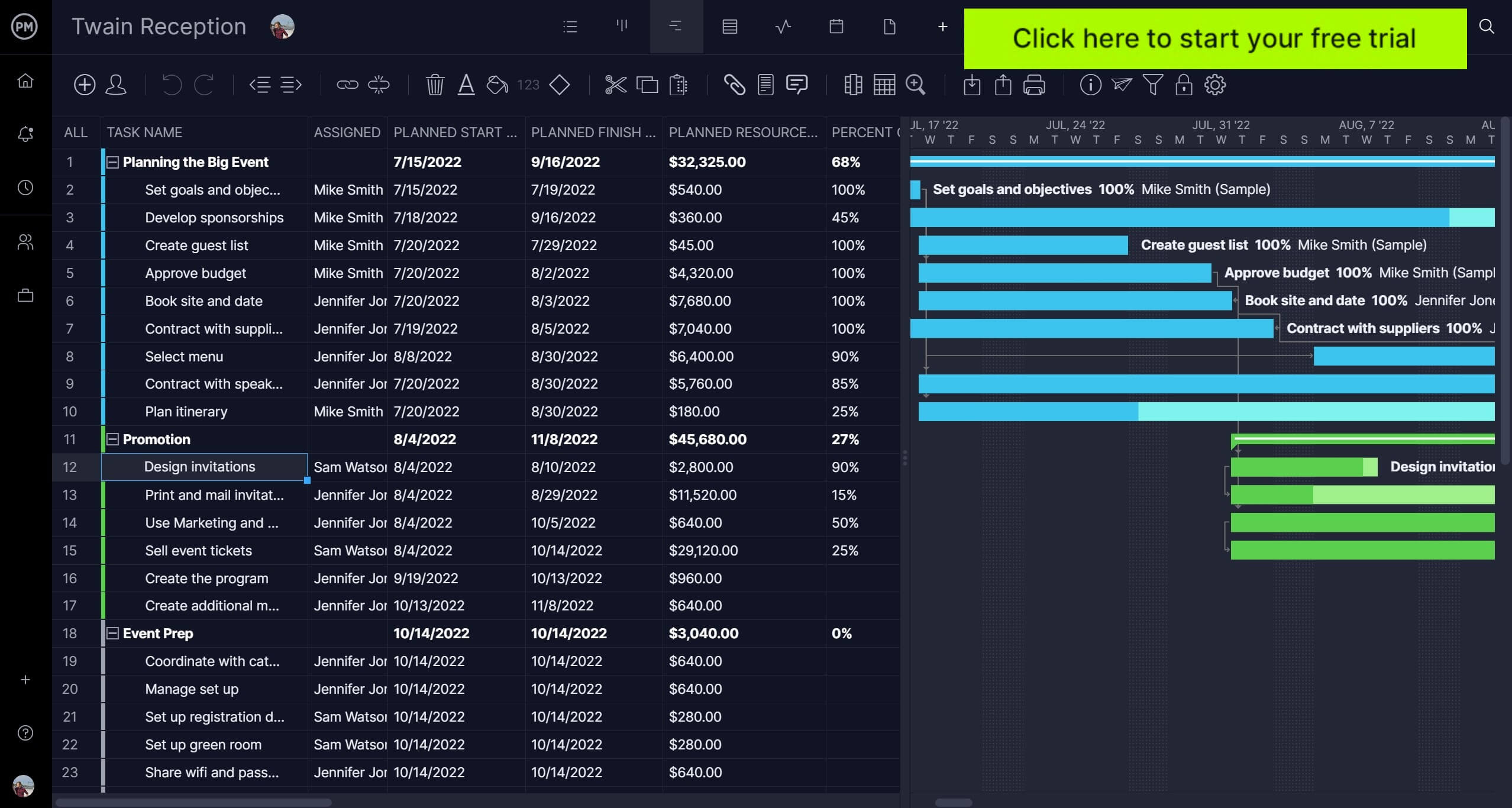
ProjectManager
by Brenna Schwartz | Oct 25, 2022Having an event is a like executing a project. It has a plan that’s executed by a team with a deadline with the final deliverable being the event. Just like a project, event management is the way you make sure everything seamlessly comes together for your stakeholders.
Event management can be anything from a birthday party for your kid to a business convention and everything in between. You can do it in person, virtually or a hybrid of both. However you chose to stage your event, event management will help make it succeed.
Event management is the process of creating an event. It involves every aspect of the event, from the idea to the planning, execution and maintenance of the event. It can even continue after the event has been done if there’s any post-event strategizing involved.
Event management starts with an event manager, a topic we’ll explore in a bit. They initiate the plan, deciding on essentials such as when and where the event will take place. They’ll also develop a theme, if appropriate, and oversee the event to make sure it runs as planned.
The event plan can involve a variety of disciplines such as sourcing designing, regulation checks and on-site management, as well as more details. Everything will be outlined in the plan. It should be thorough and coordinate activities in order for everything to happen correctly.
You could use a spreadsheet to organize your event management but project management software makes the job much easier. ProjectManager is online software that can be easily shared. It’s a great collaborative platform to connect everyone involved from the event planner to vendors. Our online Gantt chart helps you organize tasks, link dependent ones to avoid delays and even sets a baseline. That means you can track planned versus actual effort in real time. Get started with ProjectManager today for free.

Before we dive deeper, it’s important to understand that, while similar, event management and event planning aren’t the same. The general difference is that event planners are the ones with the vision for the event. They also work on the preliminary plans.
Event managers, on the other hand, are the ones who oversee the execution. They add details to the plan and make sure it’s being done correctly.
As you can see, there’s overlap. The event manager and an event planner will often work hand-in-glove or sometimes one person will fill both roles depending on the size and type of event being planned.
For example, the event manager is the one who usually makes the reservations, coordinates with vendors, hires and manages the staff and is on-site during the event. The event planner chooses the theme and concept, selects the venue, plans the menu and arranges for any entertainment or speakers.
As we mentioned, event management can be applied to any event. You have to plan for a child’s birthday party or contend with a potential meltdown. The stakes are just as high for professional events.
People who attend events don’t think about the planning and effort that’s gone into creating a great experience. They do, however, voice their objections when something goes wrong. You don’t want that.
Let’s take a moment to define the various professional events because these can have a financial impact on your business, whether you’re producing the event or running it. A positive experience builds brands, helps with networking and can drive sales. A bad one may result in lost customers and a tarnished brand reputation.
A corporate event is done by a company or organization and is put on for the employees or the customers. There can also be trade events that incorporate many companies, employees and customers. Corporate events run the gamut from formal to informal and can be designed for team building, conferences, recruiting, product launches, etc.
A private event could mean a birthday party or an event for adults. In terms of professional events, a private one could be corporate, too. The difference between this and the corporate event is that only those who are invited to the private event can attend, unlike a public event, such as a class or workshop, which is open to anyone.
An in-person event takes place in a physical space and the people who attend are there physically. Most events throughout history have been in-person, but, of course, with the advent of the internet and the development of streaming, there are now more options, as we’ll discuss below.
Virtual events are becoming more popular as technology makes these events seamless for participants. They can also help avoid expensive travel, hotel and food costs. In terms of event management, the process is basically the same. Most people, though, prefer in-person, especially when doing business. There are hybrid models available, too, which gives everyone the option as to whether they attend in person or online.
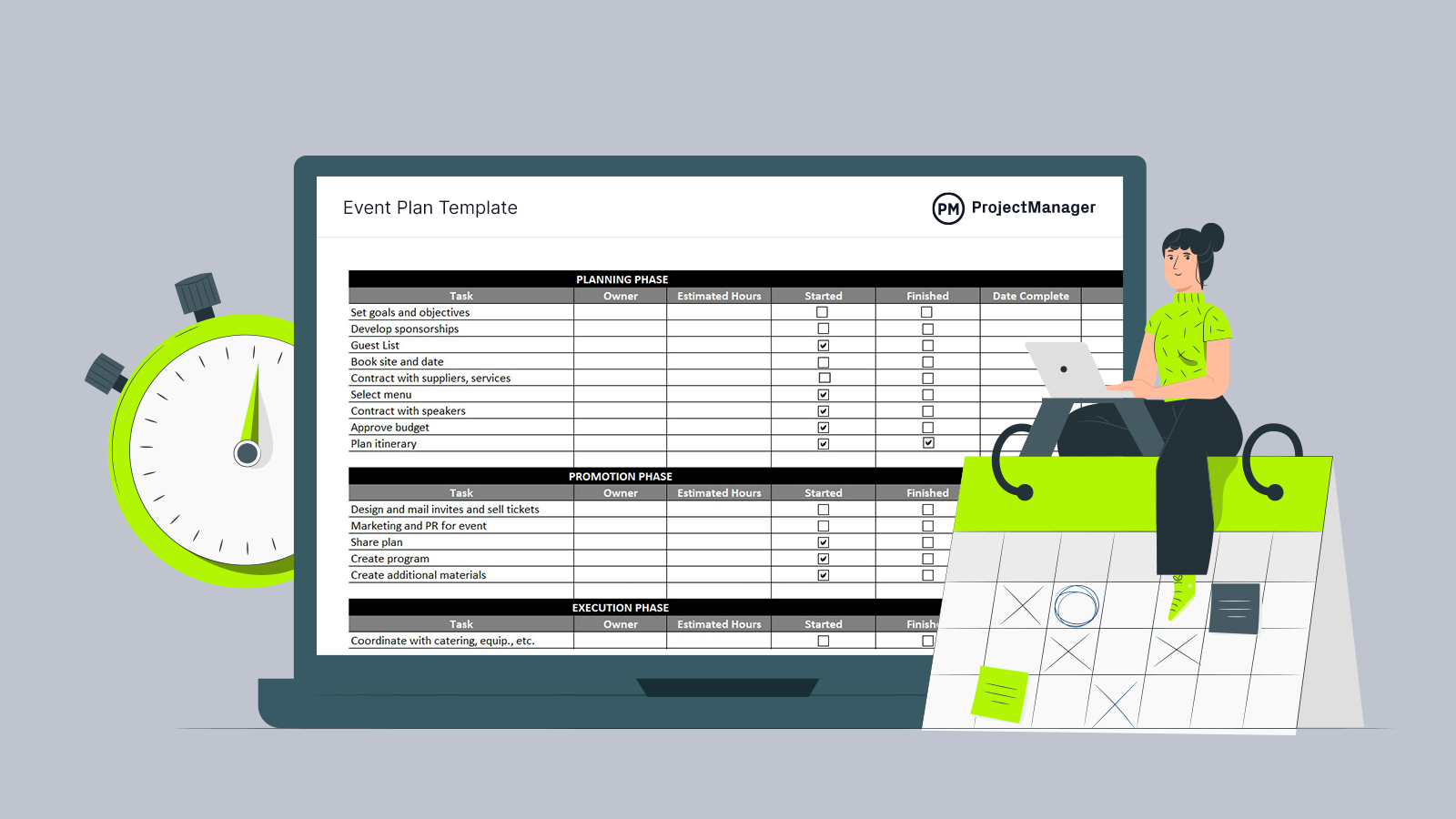
Use this free Event Plan Template for Excel to manage your projects better.
Download Excel File
Just as in any project, event management is made up of different people and skill sets to ensure the event goes off without a hitch. We talked briefly about an event manager, but that’s such an important role it deserves more detail.
In addition to the event manager, we’ll look at how an event director fits into the overall event management structure. We’ll look at roles and responsibilities for both and describe some of the skills that each needs in order to succeed at their job.
An event manager does the heavy lifting in event management. As the name says, they’re the people who manage the event. This means they execute the plan and manage the event as it happens to make sure everything is going as expected. As we explained, the event manager and the event planner can be slightly different or share responsibilities. We decided to look at the role of an event manager that would bridge both of those positions.
Event managers help brainstorm the event concept and implement the event plan. In that capacity, they deal with the budgeting of the event and all related invoicing. That means they also work with vendors and negotiate contracts and sponsorship deals. They handle logistics, keep stakeholders updated, pull needed permits and deal with any post-event reporting.
An event manager should have a degree in either public relations, communications or hospitality, though project management could also prove useful (and PM experience a must). They need superior communication and marketing skills. An event manager should be a strong leader, organized and able to multitask. Having time management skills and understanding risk management is important as well as knowing how to use a variety of software. Interpersonal skills and conflict resolution are also a plus.
An event director is responsible for planning and executing an event, but at a higher level than the event manager, who deals more with day-to-day operations. While the event manager can be involved in the brainstorming and planning, the event director has the final say. They can work for individuals to corporations, nonprofits and government agencies.
The event director is responsible for making sure that the event staff is trained and understands their responsibilities. They’ll communicate with the event team throughout the planning process to deliver a successful event. That includes making sure that vendors, caterers and other service providers have been hired and are appropriately scheduled. They oversee marketing initiatives and any event promotions to make sure they target the right audience.
An event director should a degree in hospitality, event management or a related field, such as project management. Classes in hospitality management, event planning, business management, marketing and sales are also helpful. Certifications are good to show they’re knowledgeable and qualified. Beyond that, they need to show leadership, have clear communication skills, be well-organized and understand marketing and budgeting.
To plan an event you’ll need to identify all the individual tasks that your team will need to execute. This free event plan template for Excel allows you to list down your tasks, assign them to your team members and track their progress.
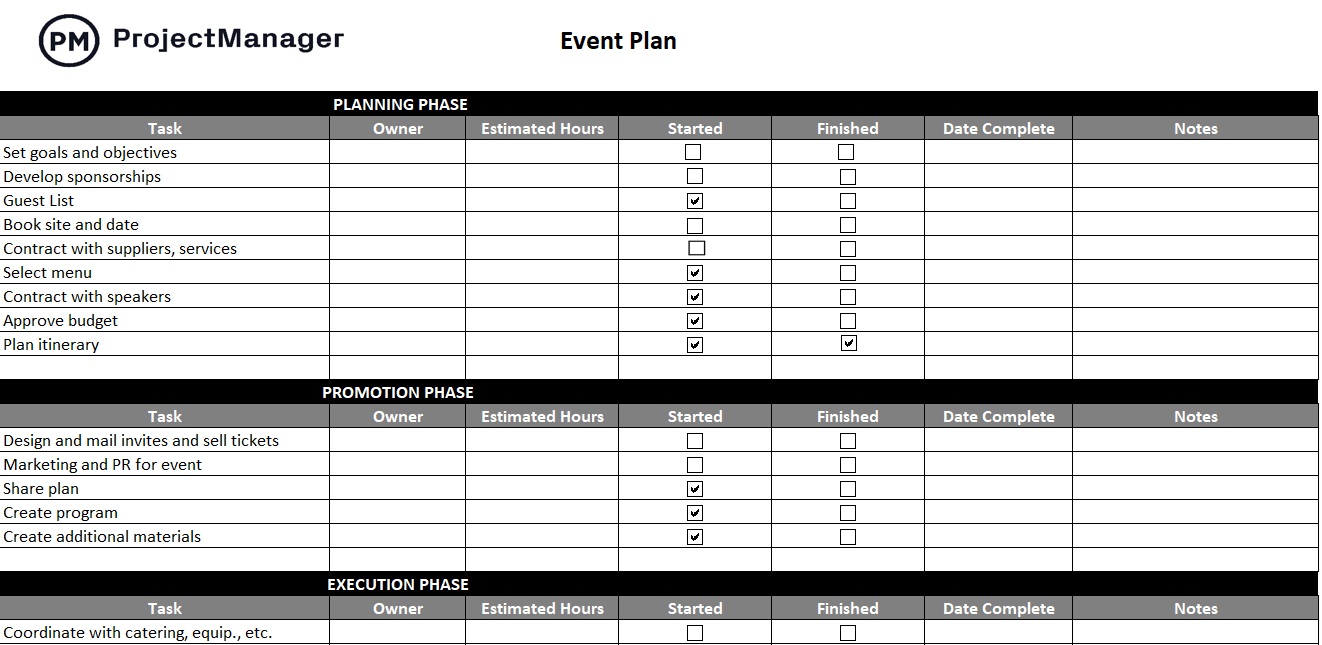
ProjectManager is online project management software that has the features you need to help you manage your event. As we mentioned, the Gantt chart can organize your activities, whether it’s a small or big event. But the Gantt chart is only one of our multi-project views.
Even if you organize your event on the Gantt, all you have to do is toggle to the calendar view to see your activities in a calendar format. That means you can see start dates and end dates for your work at a glance. Onboard your team and share the plan. They can use the list view or kanban boards if they prefer. Share view-only passes with vendors and they get transparency without being able to change anything important.
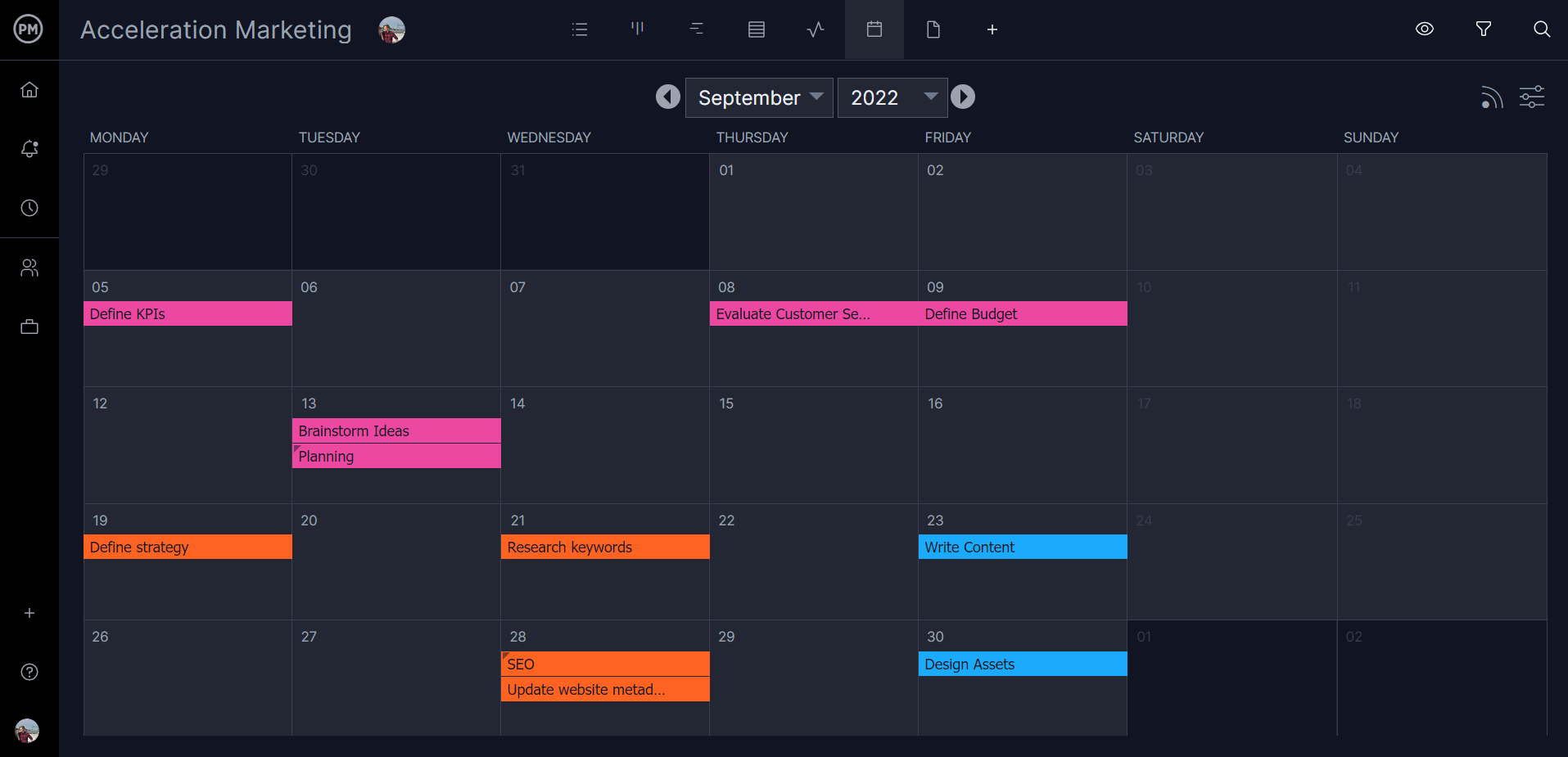
Once your team is onboarded, you can set up their availability with our resource management features. This makes it easy to see when they have PTO or holidays when assigning tasks. You can then use our secure timesheets to streamline pay and track the amount of time they’re taking to complete their work in real time. This way, if they’re falling behind, you can reallocate resources and get back on track quickly.
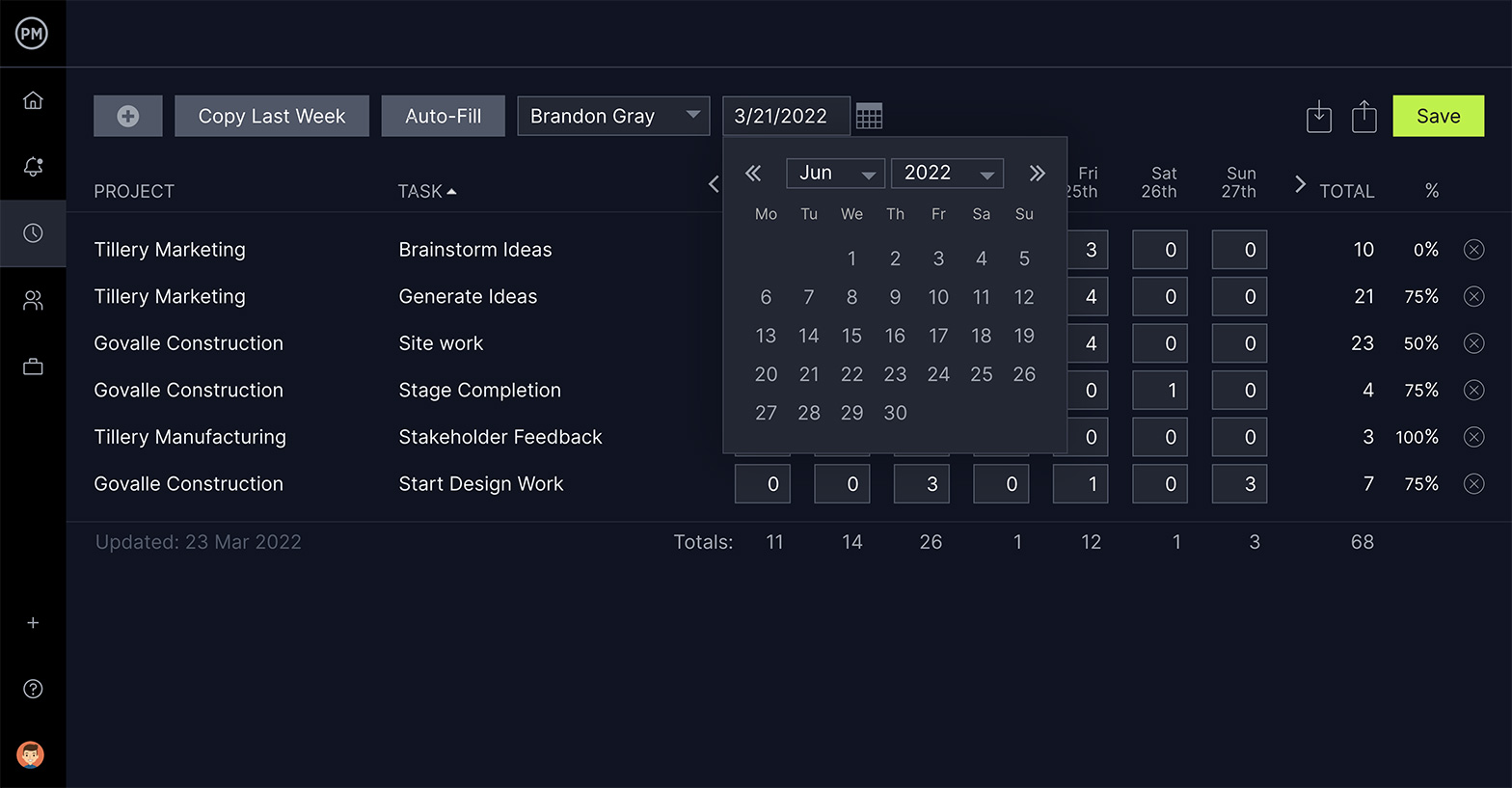
Real-time data not only helps you make better decisions but also allows your team to collaborate and work better together. They can share files, comment and tag others who aren’t assigned to the task so they can help if needed. Add to that our real-time dashboard that gives you a high-level view of the project and customizable reports that go deeper into the data and help with post-event reporting and you have a powerful ally in event management.
ProjectManager is award-winning project management software that helps you plan, schedule and track your work in real time. Our collaborative platform connects teams, vendors and stakeholders so they can all stay updated with one source of truth. Get started with ProjectManager today for free.